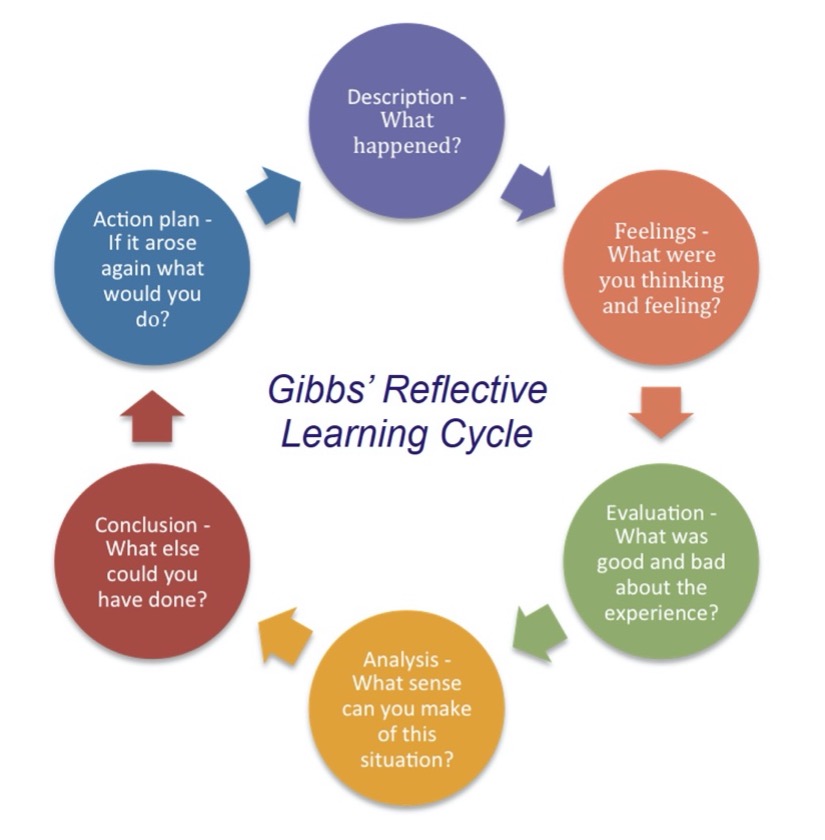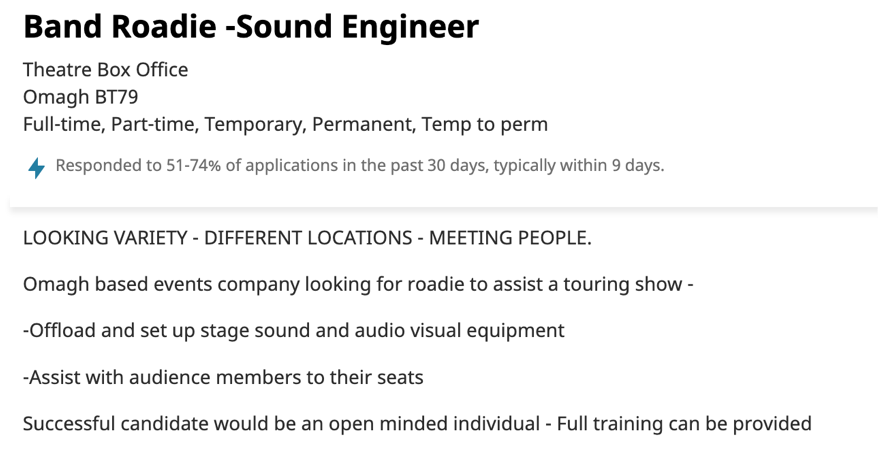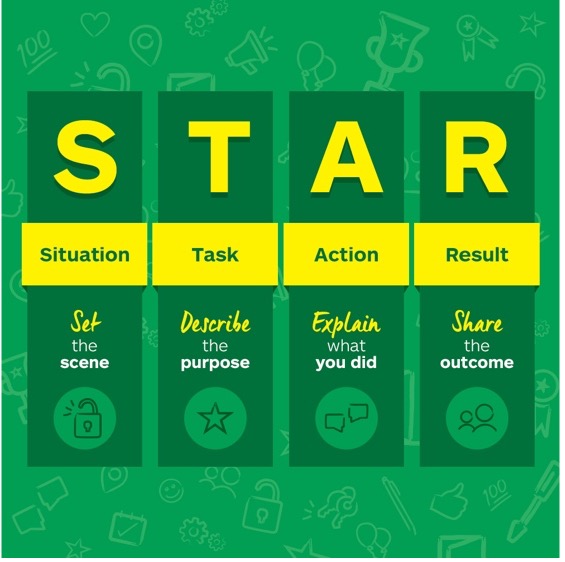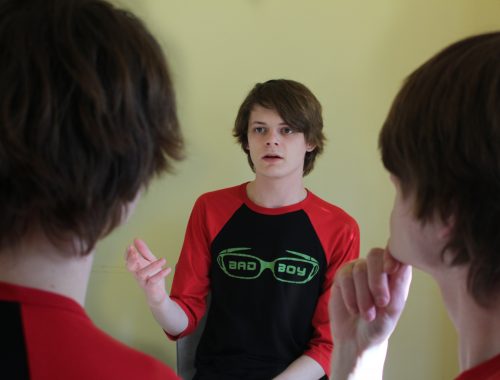Overcoming one of my biggest professional fears- Job Interviews
Job interviews- by far the most stressful part of looking for a new job. What are they going to ask? Do I know the answers? What if I forget how to speak? These are just some of the terrifying thoughts that go through my head before any job interview, so simulated job interviews sound like my idea of hell. However, despite my fear of interviews, they are an integral part of the job seeking process, so this blog post is going to use the Gibb’s reflective cycle[1] (See below) to recount my recent experience of a simulated job interview.

The job I chose to interview for was a Band Roadie-Sound Engineer with Theatre Box Office in Omagh. The job description was relatively short, simply stating that the job involves offloading and setting up stage sound and audio-visual equipment, as well as assisting audience members to their seats. Due to the description being so short, I quickly realised that I would have to work hard to stand out and prove myself worthy for the job.

I split my preparation into three sections: proving I would be a good band roadie, proving I am a good Sound Engineer and generally proving I can interview well. I found there was less preparation I could do for the band roadie side of the job, although I realised my time working in hospitality would prove useful for this. I wrote down times when I had solved problems for customers, worked under extreme stress, delt with difficult customers and situations in which I had used time management and teamwork skills. I spent over two hours watching videos and reading articles on the roles and responsibilities of a band roadie- I wanted to be as prepared as possible. As I delved further into my research, I realised that the job was very similar to my role on placement at The Black Box; this filled me with newfound confidence and enthusiasm. During the simulated interview there was very little focus on the band roadie aspect of the job, making me feel like I focused too much of my preparation on this aspect. At least I’m prepared to interview for the role of a band roadie in the future! Thinking back to how little focus was on this part of the job makes me suspect that the workload leans more heavily on being a sound engineer over being a band roadie. However, it also led me to realise in a real interview I should ask questions about any unmentioned aspects of jobs to show knowledge and interest in the job I’m applying for.
Although the sound engineer portion of the job is more technically difficult, I was more confident in my ability to fulfil the role. To begin my preparation, I looked online at the most frequently asked interview questions for Sound Engineers. Most of the questions I found required good technical knowledge and invited you to draw back on your past experiences for example ‘Can you describe how you would set up equipment at a concert?’[2]. I looked to my CV for relevant work experience and drafted answers to these questions ensuring to include technical language. During the interview, I was able to thoroughly describe the process of setting up for a gig and was able to recall previous experiences. However, I found myself digressing from questions on topics I had less experience with. This made me realise I didn’t prepare for how to respond to these questions, although in the interview I used this as an opportunity to show my enthusiasm to learn new things. In future interviews I’ll try to panic less if I’m not prepared for something.
One of my biggest interview fears is knowing the answers but not being able to articulate myself well. Ahead of the simulated interviews I researched tips and tricks on how to present yourself in an interview to overcome this. The most commonly referenced technique I read about is the STAR technique[3]. I found this approach to be particularly helpful, when structuring my answers recounting past experiences, such as when the question ‘Can you give us an example of when you had to think on your feet’ was asked.

During my interview preparation I was reminded of the importance of body language. Appearing confident and maintaining eye contact are both key factors during interviews. ‘Job Interviews For Dummies’[4] suggests watching political candidates on TV as a guide of how to act. Ironically, one of my biggest weaknesses in interviews is focusing on my weaknesses and using too much negative language. One of the main pieces of advice I read on avoiding negative language was to ‘never knock the old boss’[5], something so simple and yet so easily forgotten. As the interview drew nearer, I became more nervous, so I did what anyone would do- I googled how to overcome interview nerves. In this search I came across John Lee’s book ‘The Interview Expert’[6], in which he explains how nerves can be advantageous. Lee explains how nerves can ‘[raise] your attentiveness and shows you care about the process’[7].
When the day of my dreaded simulated interview came, I surprisingly didn’t dread it! Before heading in for my interview I made sure to look tidy and respectful. I walked in with only slightly faked confidence and tried to remember everything I had read. I managed to maintain good body language and used the STAR technique several times, however I did find myself straying into using negative language more than I should have. During future interviews I definitely need to be more confident in myself to stop me from downplaying my abilities.
And just like that the girl who hated job interviews somehow overcame her fear…….until I have to do another one!
Bibliography
Gibbs, Graham. Learning By Doing: A Guide To Teaching And Learning Methods. Oxford Further Education Unit, 1988.
Kennedy, Joyce Lain. “Chapter 1: Job Interviews Are Show Biz. Seriously!” Job Interviews for Dummies, 4th ed., Wiley, Hoboken, NJ, 2012.
Lees, John. “5 Handling Interview Nerves.” The Interview Expert: How to Get the Job You Want, Pearson Business, Harlow, 2012.
“Sound Engineer Interview Questions.” Betterteam, https://www.betterteam.com/sound-engineer-interview-questions.
“The Interview: A View from the Other Side of the Fence.” GE, GE Carrers, 24 Oct. 2021, https://jobs.gecareers.com/global/en/blogarticle/the-interview-a-view-from-the-other-side-of-the-fence.
[1] Gibbs, Graham. Learning By Doing: A Guide To Teaching And Learning Methods. Oxford Further Education Unit, 1988.
[2] “Sound Engineer Interview Questions.” Betterteam, https://www.betterteam.com/sound-engineer-interview-questions.
[3] “The Interview: A View from the Other Side of the Fence.” GE, GE Carrers, 24 Oct. 2021, https://jobs.gecareers.com/global/en/blogarticle/the-interview-a-view-from-the-other-side-of-the-fence.
[4] Kennedy, Joyce Lain. “Chapter 1: Job Interviews Are Show Biz. Seriously!” Job Interviews for Dummies, 4th ed., Wiley, Hoboken, NJ, 2012.
[5] Ibid.
[6] Lees, John. “5 Handling Interview Nerves.” The Interview Expert: How to Get the Job You Want, Pearson Business, Harlow, 2012.
[7] Ibid.
Simulated Hell
The Pressure Cooker
You May Also Like

Finding the Right Balance: My Simulated Interview Experience
14 February 2022
Surprisingly Worthwhile
18 February 2022
